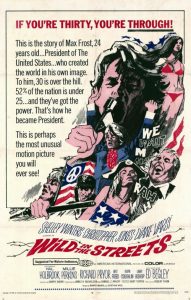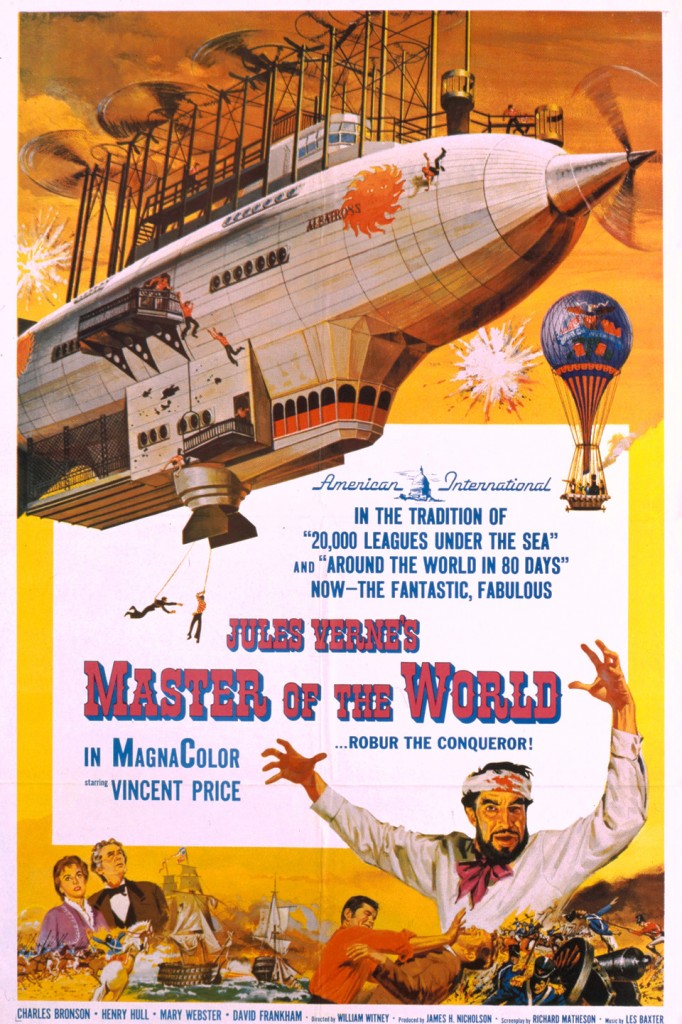
1968’s cult classic “Wild in the Streets” deserves a look this tempestuous election season.
By Scott A. Cupp
This is the 168th in my series of Forgotten, Obscure or Neglected Films.
Since it is an election year, I thought it might be wise to review a politically charged film from that hotly contested year of 1968. I was not yet old enough to vote when this came out, but I was interested in the political process and watched both parties at their national conventions and the attendant folderol that went with it. I was (then and now) very anti-war and saw it as a major part of the campaigns.
Somewhere that year, the theaters on Ft. Sam Houston (where I was living) managed to show Wild in the Streets, and I somehow got to see it, even with an R rating. Perhaps the clerk thought I was one of the soldiers since I had a burr haircut at the time. Anyway, I saw it and thought it was a hoot.
Flash forward 48 years and I see that TCM was going to broadcast it one night while I was not at home. Mr. DVR came through for me, and I captured the film again. I watched it the other day with my wife and found it interesting, naïve, stupid — and totally relevant to the current political scene.
Max Flatow Jr. (Christopher Jones) is raised in a home with a shrill, dominating mother (Shelly Winters). It does not take much for him to rebel, beginning with manufacturing drugs and explosives in the family basement. He blows up his father’s new car and leaves home. Four years later, he is 22 and a multi-millionaire rock star under the name Max Frost with his band the Troopers – which also includes 15-year-old attorney Billy (Kevin Coughlin) on guitar, former child star Sally LeRoy (Diane Varsi) on keyboards, Abraham “the Hook” Salteen (Larry Bishop) on bass and trumpet and anthropologist Stanley X (Richard Pryor) on drums. They are young, rich and bored. They’re also asked to perform at a political rally for Congressman Johnny Fergus (Hal Holbrook), a young candidate urging for voting rights for 18 year olds, which was a hot topic at the time and one I supported. Max does a live gig for the rally but pushes his own agenda, which is for the vote to be extended to 14 year olds.
The reaction is overwhelming, and Fergus finds himself a reluctant ally to the charismatic rocker. Established political advisors are appalled and want Fergus to drop Frost like a hot potato. Among those is Senator Allbright (Ed Begley). With youth demonstrations for the 14 voting age expanding across the country, Frost and Fergus compromise on 15 and Ready. They select that age so Billy can actually vote. Fergus is elected in a landslide.
Just as the election happens, a local congressman, aged 84, dies. To be elected to Congress you must be 25. Coincidentally, Sally Leroy has just turned 25 and finds herself appointed to Congress. Her first act is to introduce a constitutional amendment reducing the age for someone elected to Congress or the presidency to 14. A water supply spiked with LSD reduces the joint session of Congress to hysterical mania and the amendment is approved. (No one bothered getting the states to ratify it, but that’s just a detail.)
Soon, Max Frost is president and legislation is passed making people go into mandatory retirement at age 35, at which time they’ll be sent to camps where they’ll be fed, clothed, and provided LSD on a regular basis.
It progresses from there, but the tale of a charismatic outsider who rouses his troops and maneuvers into the political arena sort of resonated with me. I’m not going to get into a political discussion. I know who I am voting for and I hope you know your own mind also. The upcoming vote will be divisive I am afraid, but I hope some form of sanity manifests itself during the process.
I had fun with the Wild in the Streets. Christopher Jones had a short run in Hollywood, bowing out after the death of Sharon Tate (with whom he had an affair) left him devastated. IMDB only gives 10 acting credits for him and only one after 1970 (Mad Dog Time in 1996). He died in 2014.
It’s not a good film (too absurd and too many plot holes), but it is a better film than American International normally made. Give it a shot. Songs by Barry Mann and Cynthia Weill include “Shape of Things to Come,” which made it to #22. It was #1 in San Antonio as I recall from that time. It is heard three times in the film.
Series organizer Todd Mason hosts more Tuesday Forgotten Film reviews at his own blog and posts a complete list of participating blogs.

